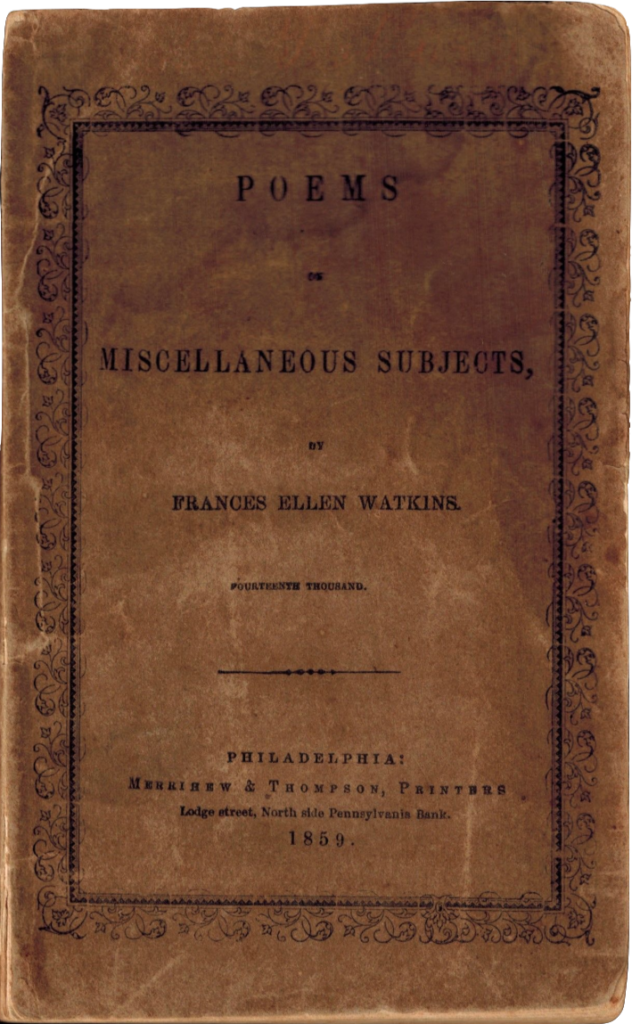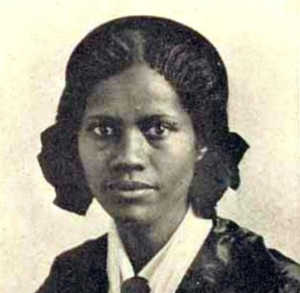Frances Harper, poet.
Frances Ellen Watkins Harper* (1825-1911) was one of the most prolific producers of texts distributed as abolitionist ephemera.
Born a free black woman in Baltimore, Harper (then known as Frances Ellen Watkins) published her first work of poetry, Forest Leaves, in 1845 at age twenty. Harper’s long career spans a tempestuous time in American cultural and political history, and her expansive body of work is similarly reflective of a period of great technological and literary change. Harper took a personal hand in publishing and disseminating her own work, working closely with printers and distributing many of her books herself.
As early as the 1850s, when the abolitionist movement was at a fever pitch, Harper flourished as an anti-slavery orator, public intellectual, poet, journalist, and fiction author. Harper’s short story “Two Offers” (published in the Anglo-African Magazine in 1859) is considered one of the first short stories published by a black author, and her 1892 novel Iola Leroy or, Shadows Uplifted was considered the first published novel by a black female author prior to the fairly recent discovery of Our Nig (written by Harriet Wilson and published in 1859) and The Bondwoman’s Narrative (written by a fugitive enslaved woman under the pseudonym Hannah Crafts sometime between 1853 and 1861).
 In 1854 Harper published Poems on Miscellaneous Subjects, a collection of poems distributed in pamphlets at her anti-slavery lectures and first re-published in abolitionist newspapers.** The new collection would definitely last longer than the lightweight newspapers and pamphlets where the poems had first appeared, but the re-publication also meant the poems were permanently divorced from their original contexts. Meredith McGill observes that “[i]t is easy to lose hold of the importance of spatial and temporal dislocation to…Harper’s career and writing when we read her poems as if they were written or somehow destined for the readers of a book. In carefully edited collections… her poems appear as only occasionally successful lyrics; it is hard to understand either why the poems were valued or how they worked.” This project hopes to restore the immediate ephemeral contexts of Harper’s poems to allow readers to approach them in the spaces where they first came to life.
In 1854 Harper published Poems on Miscellaneous Subjects, a collection of poems distributed in pamphlets at her anti-slavery lectures and first re-published in abolitionist newspapers.** The new collection would definitely last longer than the lightweight newspapers and pamphlets where the poems had first appeared, but the re-publication also meant the poems were permanently divorced from their original contexts. Meredith McGill observes that “[i]t is easy to lose hold of the importance of spatial and temporal dislocation to…Harper’s career and writing when we read her poems as if they were written or somehow destined for the readers of a book. In carefully edited collections… her poems appear as only occasionally successful lyrics; it is hard to understand either why the poems were valued or how they worked.” This project hopes to restore the immediate ephemeral contexts of Harper’s poems to allow readers to approach them in the spaces where they first came to life.
* For the sake of space, I refer to Harper by her eventual (married) last name, but the evolution of her name over time is an interesting window into her career’s own evolution. Her early work was published under “Frances Ellen Watkins” or “Frances E. Watkins,” a label that associated her with the famous Watkins abolitionist family in the northeast.
** There is some debate over whether or not Harper regularly read the poems themselves at her lectures. Contemporaries like William Still did confirm the practice of selling her books of poetry afterwards, stating that “[f]ifty thousand copies at least of her four small books have been sold to those who have listened to her eloquent lectures.”
